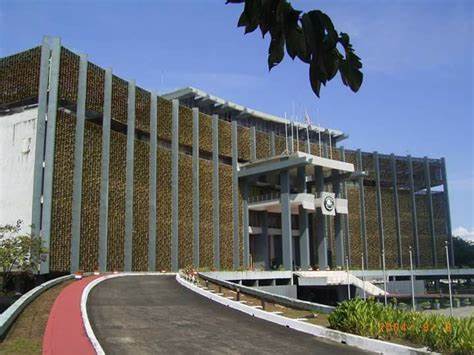As Judiciary Rejects US$17M National Budget Allocation: Upholding Rule Of Law With The Lowest Budget?
PHOTO: Chief Justice Sie-A-Nyene G. Yuoh
By Garmah Never Lomo, garmahlomo@gmail.com
TEMPLE OF JUSTICE, Monrovia –The Judiciary Branch of government in Liberia through the Supreme Court headed by Chief Justice Sie-A-Nyene G. Yuoh has vehemently rejected 2024 budget allotted to them.

The Executive Mansion in Monrovia–Home of the Liberian Presidency
The rule of law is part of President Joseph Nyuma Boakai ARREST Agenda but how will the rule of law be upheld when the Judiciary is receiving the lowest budge while the two branches of government receiving the Lion share of the budget?
Many Judicial and political analysts saw this coming, as the Chief Justice sent out a public caveat last month.
In a loud voice, Chief Justice Sie-A-Nyene G. Yuoh has defied has stood up to the Legislature telling Liberian Lawmakers that the Judiciary Branch of government will never appear before them to defend their budget, because the President does not appear before them to defend his budget. ‘We’ll Not Appear Before Lawmakers To Defend Judiciary Budget’– Liberia’s Chief Justice Yuoh Vows – News Public Trust
Even though Article 3 of the 1986 Constitution of the Republic of Liberia states: Liberia is a unitary sovereign state divided into counties for administrative purposes. The form of government is Republican with three separate coordinate branches: the legislative, the Executive and Judiciary. Consistent with the principles of separation of powers and checks and balances, no person holding office in one of these branches shall hold office in or exercise any of the powers assigned to either of the other two branches except as otherwise provided in this Constitution; and no person holding office in one of the said branches shall serve on any autonomous public agency.
The Judiciary in a press release issued on Wednesday June 5,2024, said, it viewed the appropriation or allocation of US$17M and one-off contingency amount of US$3M which constitutes 2.8% of the National budget as an imposition by both Legislature and Executive Branches of government on a co-equal Branch of the same government which it is not prepared to accept.
The Supreme Court said, it acknowledges and uphold the power bestowed upon the Legislature to “make appropriations for the fiscal governance of the Republic” as enshrined in Article 34(d) of the Liberian Constitution (1986).
This court has also upheld the longstanding principle of constitutional interpretation which states in part, “ the constitution must be interpreted in light of the entire document rather than a sequestracted pronouncement, as every provision of the constitution is of equal importance. None of the provisions of the Constitution should be interpreted to nullify or substantially impair the other provisions “the release said.
The released further indicated that it is within this legal context that Chapter VII of the Liberian Constitution (1986) and the supporting statuses within the New Judiciary law impose a legal obligation upon the judiciary Branch to effectively and efficiently manage the Supreme Court of Liberia and all of its administrative units. This includes 22 Circuit Courts across the fifteenth political subdivision of the country along with judges and staff, 75 specialized courts across the 15 political subdivisions of this country with their judges and staff as well as 160 magisterial courts also across the fifteenth subdivisions of this country with their magistrates and staff in order to ensure that the rule of law prevails within the borders of the country.
The lack of adequate support to the Judiciary by National government over the years have resulted to deteriorating infrastructures, lack of logistics and worsening conditions of service at the Judiciary and this is substantially impairing the duty of the judiciary branch of government as mandated by the provisions of Chapter VII of the Liberian Constitution referred to Supra.
The release noted that in the spirit of coordination and cooperation, meeting were held with the leadership of the Legislature and the presidency prior to the passage of this year’s fiscal budget in which the judiciary brought to the attention of its other two co-equal Branches of the Liberian Government that the constant violation of the financial Autonomy Act of the Judiciary law, which consistently relegated an entire branch of government to a mere department under the Executive Branch was not only undermining the Rule of law in Liberia but also debasing a co-Branch of government.
It appears evident, however, from the passage of the fiscal budget 2024, that both the Legislative and Executive Branches of the Liberian government are not prepared to regard the Judiciary as a co-equal Branch of the same government with attending needs as they have elected to appropriate a meager 2.8% of the National budget to the Judiciary (the 2nd largest Branch), whilst the same Legislative Branch (the smallest) allocates 13.84% to itself and 83.36% to the Executive Branch.
The Judiciary noted that this has happened despite assurances made that such serious concerns of the Judiciary was going to be addressed even if not in its entirety.
This, the Judiciary views as unfair, unjust and an attempt by the other two branches of government to further reduce the Liberian Judiciary to nothing; a condition unacceptable to the Liberian judiciary.

